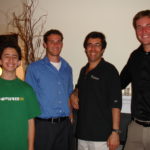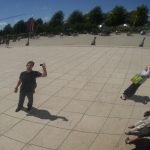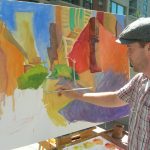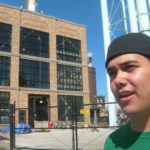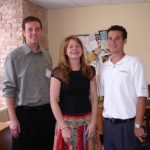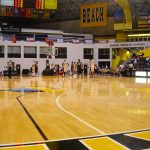First off, let me say that if we had an award to give out to a person that has pursued their passion to the fullest extent it would have to go to John Freedman. John was one of the most interesting people that we talked to on our 2006 tour. His story is one in which a passion was identified and built upon in a most unusual and beautiful way.
 It starts in 1976, when John graduated from Brown University with a degree in English Literature. Feeling that he could do something more for humanity, he took a handful of science courses in addition to his degree’s coursework. As a result of his academic exploration, John developed a love for medicine. Upon completion of his pre-med requirements, he applied to medical school at Yale. He attributes his acceptance letter to his diverse academic portfolio, which helped differentiate him from competing applicants.
It starts in 1976, when John graduated from Brown University with a degree in English Literature. Feeling that he could do something more for humanity, he took a handful of science courses in addition to his degree’s coursework. As a result of his academic exploration, John developed a love for medicine. Upon completion of his pre-med requirements, he applied to medical school at Yale. He attributes his acceptance letter to his diverse academic portfolio, which helped differentiate him from competing applicants.
John was attracted to Yale because of their prestigious psychiatry program. After receiving practical experience in the field however, he realized that psychiatry moved much too slow for his liking. While working in an intensive care unit he became interested in the dynamics of internal medicine. He became fixed on becoming an anesthesiologist. This road would eventually lead him to Santa Rosa, California where he took a position as chief of a newly constructed hospital.
After four years of college, another four years of medical school and a brutally demanding medical internship, John accepted a position as a research assistant in Salvador, Brazil. His time in Salvador exposed him to new people and experiences, which inspired him to further his involvement in third world medical projects. He would later return to Brazil to work in a tropical disease hospital, followed by a stint in Zambia, Africa as a visiting professor in ‘94, in ‘97 went back to Africa to Kilimanjaro Medical Center. Then in ‘99 he received a letter from President Clinton requesting that he lead a group of physicians to Cuba. After traveling to all these places and hearing people ask what they can do to contribute, John realized that some kind of organizational structure should be created. The culmination of both his education and first-hand experiences was the development of Medical Exchange International (MEI), a non-profit organization dedicated to international health care collaborations.
“Small things in these type of environments can make a big difference. I was in Cambodia last October, and they had one piece of equipment in their hospital which told a doctor some valuable information about your blood by percent. The wire on this piece of equipment was frayed to the point that its days were numbered. When I got back home, I found a replacement cable to send back over there. Very small thing, but when you look at what they really need, it makes a huge difference.”
Not such a little thing is the fact that Kilimanjaro Medical Center’s latest medical book was published in 1968. MEI took it upon themselves to change this. They raised the money to do so in a most unconventional way. Pledges sponsored John’s ten year-old son in his mission to climb Mount Kilimanjaro. He accomplished the feat and enough money was raised to purchase and ship new medical books to the facility.
John Freedman
Please visit their website at: www.medicalexchangeintl.com with the following story in mind. A patient of John’s had a dramatic cesarean section experience, and the husband wanted to thank John for his assistance. The husband was a very tech-savvy guy and wanted to learn more about MEI. He researched the organization online and found that they had no official website. He approached John and offered to build the website pro-bono. As a result, the general public can now read and follow MEI’s past accomplishments, current projects and plans for the future. John is currently a practicing physician and chief of department for Kaiser Permanente. He also leads “Hikes for Healthcare” an MEI fundraiser.
“Hard work, focus, and believing what you are doing are the keys to getting by in school. Really learning from something and going beyond what you’ve learned secondhand is important. It also is really important to have good people around because that has a huge influence on you and your learning and development as a person. But it develops over time.”
John has been to a little over 80 different countries in his lifetime. Going to different countries have been fascinating, and John says that even if your introductory experience may be formalized or propagandistic, it is still better than no experience because you can look someone in the eyes and see them and their society. “The most interesting countries are the ones that are emotionally involved, and those are countries that I could go to again and again and again. Each time I go it’s like peeling an onion, and you keep getting to a new layer, and the way that you get to that next layer is to become emotionally involved in that country.” Cuba, Vietnam, Brazil, and Japan were the most fascinating countries that John said he has been.
We had to ask him about the dangers of traveling because he was in Vietnam for the first SARS breakout, and for the Avian flu! He has traveled in a lot of malarias regions, where every 30 seconds a child dies of malaria. But John says “it boils down to taking calculated risks, having common sense, and showing vigilance.”
Another question we asked was if he could give students any piece of advice, what would that be.
“The secret to happiness is to find something that you love to do and become the best at it, which is the best you can be. And then, find someone that will pay you well for it.”
We are in a coffee shop. Occasionally blending takes place.
I went to college at Brown. In my time you went to college to broaden your horizons. I actually majored in English and Comparative Literature. I was also humanistic and wanted to do something helpful and practical.
Medicine was not something I had a lifelong dream about. But the more I learned about it, the more it attracted me. Really had no ambivalence about that at all. Felt really great about it.
I went to medical school at Yale. That was my top choice.
Since moving up to Santa Rosa, I had a wonderful opportunity to be the chief of a hospital when it was being developed. Been up here since 1989.
The times were really different. People went to college without any career track.
Medicine was a career that the best and the brightest wanted. It was dynamic, prestigious. You change the world with health.
I was lucky because I approached it with a different angle. I had an accidental advantage. I majored in English but fulfilled all my pre med requirements. So I went in the small pile when it came to getting into medical school. That really gave me an advantage over all the other students because of the different approach, the different path that I took in college.
The history of MEI. I just decided I wanted to do a little something different. I graduated high school in ’72. College in ’76. Medical school in ’80. I wanted to take a year off. The reason why I came out here was pretty clear. I had spent 4 years in Providence. 4 years in New Haven. I said I’m going to go to a really great program in a really great city. I narrowed it down to USF in San Francisco. That’s how I ended up here, for an internship year.
After that year, I was able to get a position as a researcher in Brazil. It was studying menagitis. The project was a major unraveling of the study of AIDS. It was in Brazil and in a city called Salvador. I went to the library and it said, ‘The cultural capital of Brazil. The cradle of Brazilian culture, cuisine, music…’ I said sign me up!
Going to Brazil was a key experience.
When AIDS first came out it was called GRID. Gay Related Immunity Deficiency. Initially people said it wasn’t an infectious disease. Oral Sandy and Diane Fienstein worked through and unraveled this.
That time I spent in Brazil was responsible for me getting involved in third world projects and starting my own non-profit. And leading groups to third world projects.
15:09- Not much here…so far. He went to Brazil upon the request of one guy who was instrumental in AIDS research, also a professor at USF, and the experience changed his life.
I went to Africa as a visiting professor. In ’97, went back to Africa for Kilmanjaro. The kids were 8-10.
I got a letter from the state department in ’99 if I could lead a group to Cuba. Because Clinton had just opened up a program called Leading the Support of the Cuban People. At first I thought it was a joke or outlandish. But it turned out to be true. So I lead this group to Cuba. And then led several others.
I realized, particulary after the Africa trips, when people would say to me, ‘Is there anything I can do?’ I would go down and bring medical books- maybe $5,000 worth- which is meaningful in those environments. I thought that maybe if I made it a little more structured, where if I formed a non-profit and people could get tax deductions, maybe there would be more involvement. You could amplify it in a small way.
Small things are needed to make big differences in environments. I was in Cambodia last October. They had one pulse oximeter. This is a vitally important monitor for a hospital. It’s an absolute standard to have here in America in every operating room. They only had one of them in the entire hospital. And the cable on it was frayed to the point where basically, it’s days were numbered.
I looked at the monitor, was able to recognize the monitor. I got back here. I made a couple of phone calls. I was able to get a brand new cable. And I knew someone going to Cambodia two weeks later. I gave him that cable.
So very small thing, but as I said, it’s a linchpin item. Small difference, but literally, that’s going to save some lives.
It’s small, but when you look onsite and see what they really need, you can make a difference.
We didn’t have a website until a few years ago. A patient took a really dramatic course during a caesarian section. They wanted to do something to thank me. They decided to ask around. Instead of getting the doctor a bottle of wine, some people do that, they asked the nurses. I didn’t know about any of this.
Some of the nurses can come on my Cuba trips, and so they knew about my passion for MEI. They said, ‘Oh yeah, he goes to Cuba and Vietnam and this and that.’ So the husband of the woman who had the dramatic delivery went online to look us up and find out about us. But there wasn’t a website. We didn’t have a budget for that. That’s when he came to me and said, ‘You need a website. I’m going to buy it for you.’ That’s where the site came from.
That’s an example of how things come together. There’s some passion to do something that’s meaningful. It doesn’t have to be big and fancy. But, if it’s got the passion, and it’s got the meaning, it natural gets done.
How much MEI grown since the web prescence?
It hasn’t grown a lot. I am a full time practicing physician. My non-profit is something I do with no administrative budget. It’s something that I manage largely by myself with my wife and my kids and a couple other people. My feeling of opportunity is not to take the next step. Because it works better when it’s smaller. Rather than trying to save the world. It has the potential. And that could happen someday. It just continues doing what it does. But I’ve found my comfort zone and it works.
In my sixties I plan on still being active and going abroad and being involved in medical things.
Average people involved with opportunities?
What was your key to being successful in college?
It’s just hard work, focus, and believing in what you’re doing. I guess like anything else. Some of the value of getting an education and learning that focus and those habits. When you’re really trying to learn something beyond what you’ve learned from the secondhand.
It also depends a lot on the people you’re around. That has a huge influence on you and your learning ability. I think that’s important when you select what you’re going to do, and the circles you’ll be in when you make that decision. But a lot of it comes over time.
How many countries have you been to?
Many. A little over 80 at this point. There are certain countries that are fascinating to visit. All are interesting to visit. I’ve got a trip scheduled to go to North Korea. You’d say, ‘Well, why would you want to go there?’ Because its fascinating. To see a society that’s totally different.
Travel, it sounds trite, but travel is the passport to peace. To see a country, even if the people aren’t allowed to open up to me as they would in a formalized propagandistic country, that’s still better than no contact. People can look you in the eye and see you’re a person with an idea.
North Korea might be the last place on earth a lot of people would want to go to. I find the country fascinating with opportunities.
The countries that are most interesting to me are the countries that are emotionally involved. Those are countries I want to go to again and again and again. There’s only a handful of those. When I go to those countries it’s like peeling an onion. It’s another layer I get to. And you could say that intellectually the country is interesting and has great depth, but that’s true of all things. What gets to you the next and what makes you want to keep peeling another layer of the onion is that you’re somehow emotionally involved in the country. It’s history, it’s people, it’s current events. Some people it may be the art. For others it may be the food. There only a select few countries that I feel that way about. Cuba is one of them for sure. Vietnam is one of them. Brazil is one of them. Interestingly enough because this country isn’t a third world country like the others, but Japan. I would say those are the four countries that I have been to, and would like to go back throughout my life to explore again and again and again.
They’re all fascinating on every level. But for me, those are the most emotionally involved.
People ask me about what I do and they say, ‘Well, it’s just about health.’ I was in Vietnam for the Avian flu. I was in Vietnam for the first SARS breakout. And then there again for the Avian flu. I’ve traveled in a lot of malarias regions of the world. Malaria is still the number one cause of hospital admission in the world. Believe it or not, every thirty seconds, a child dies of malaria. Staggering statistic. Think about the billions of people in developing nations. Every thirty seconds.
So all these things. Health issues. Safety issues. They kind of, when you put in perspective, you have to look at what the risks are. You have to be vigilant. And there is some risk involved. I think it’s true in the business world, I think it’s true in life.
I also have that kind of personality. I have a little bit of that daredevil gene. They’ve actually found a daredevil gene. It’s for crazy people. Not for people like you or me. But for people are not happy and are clinically depressed unless they’re freejumping or kayaking over class 6 rapids, or other truly extreme dangerous things.
I think like another gene, there’s variable degrees. There are some people that I think have that propensity and are stimulated off of what makes them happy. And what makes them fulfilled and happy is having some degree of risk. So for me, that’s all part of it.
When I lead groups. For me, it’s more of a challenge to be responsible to people who may not have that experience of travel and are looking to me for that experience.
One of the things I’ll do when I take a group to Cuba or Cambodia is I’ll wear my soak up t-shirt from rapids in Zambeze (in between Zambia and Zimbabwe). It’s quite a rafting trip because besides having rapids that are class 5 and 6, it’s different if you fall out because there are eighteen foot crocodiles in line for you.
It makes them feel reassured and they get the picture that it’s important to assess the risk, and I’ve been to a lot of places so I can assess the risk with them and take the appropriate actions.
So basically it boils down to common sense and vigilance but yeah, there risk factors. But like anything else, you don’t want to be stupid. I’m not going to go into the jungles of TeKal at night with short sleeves and shorts and not taking malaria prophylaxis. That’s a good way to die.
It’s also true with altitude issues. Only one out of seven people who climb Mount Kilmanjaro make it to the top. The main reason they don’t make it is the altitude. It’s a forced rapid ascent that gets you up in three days and back down. But there’s medication you can take to reduce that risk and reduce the swelling. There are a lot of people at camp at a little over 14,000 feet that were frusturated. Young, healthy people flat on their back because they went up a little too fast and weren’t taking medication that you could take. It’s very physiological.
You have to know the risks.
Give some college kids advice.
This isn’t orginial, and I’ve read it but can’t remember who said it, but it’s extremely astute to me, and it’s very right and I’ve told my kids this many times, it’s that the secret to happiness is find something that you love to do and become the best at it. Which is the best you can be. Not everyone can be the best in the world. But the best you can be. And just be really, really excellent. Then, find someone that will pay you well for it.
That’s what it boils down to. Pay you well is according to whatever your goals are. For me it’s to be able to raise my family and do things that are meaningful to me. For others it may be to make millions of dollars. My hat’s off to them. Whatever it means. Put A & B together. You guys have hit it on the head. Pursue the passion.
It’s a core concept, and you’ve encapsulated it very well with those three words. Take a concept. Hikes for healthcare. That’s enough to grab them in and make people wonder what it’s all about.
Biggest accomplishment?
That’s an easy one for me. I was thinking about how this interview would go. Pursue the passion. Because I have several passions. Medicine is a calling and a passion. Third world medical work. Travel on it’s own. It’s a way of learning about the world and sharing with the world. Travel is the passport to peace. And my family. My biggest accomplishment is having a wonderful family.
This is all part of that. We’ve been able to share some of it all together.
I’d take my kids to all these countries and pretty soon when it would be time to announce the next trip, my kids would ask, ‘Dad. Do they have flush toilets?’
My kids saw a lot in Africa. We saw a kid the same age as my son, maybe eight years old. This kid had a piece of scrap metal. Just this piece of twisted scrap metal attached to a string. And he was carrying it behind him, dragging it around and having a good time. I remember my son looking at that and saying, ‘Dad, why don’t they have a real toy. Where are the toy stores?’ I could see the gears turning
I think some of the value is character. Travel does that.
I’m so lucky to have a wife with similar values. She wants to get more involved. Retirement we plan to do medical work in the developing world.

